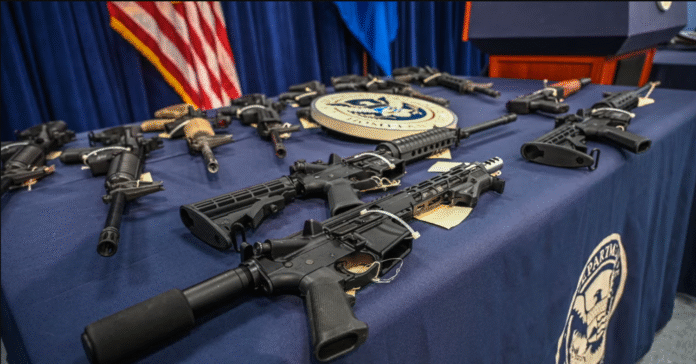Chinese Man Jailed: Weapons Smuggling Plot Exposed
A Chinese man jailed in the United States has drawn global attention after being convicted of sending firearms, ammunition, and sensitive technology to North Korea in violation of international sanctions.
The U.S. Department of Justice announced that 42-year-old Shenghua Wen, a resident of Ontario, California, was sentenced to eight years in prison for his role in the illegal arms trade. Prosecutors revealed that Wen received nearly $2 million from North Korean officials in exchange for shipping military supplies from the U.S.
This shocking case underscores how North Korea continues to find ways to bypass strict United Nations Security Council sanctions that ban it from trading weapons and military equipment.
Who Is Shenghua Wen?
The Chinese man jailed in this high-profile case first entered the U.S. on a student visa in 2012. According to court filings, his visa expired in late 2013, but he continued to stay illegally.
The Justice Department described Wen as an “illegal alien” who secretly operated as an agent of North Korea. Before coming to the U.S., Wen allegedly met with officials from North Korea’s government at an embassy in China. These officials instructed him to procure goods and smuggle them to the isolated regime.
By 2022, Wen had established communication with two North Korean officials through an online messaging platform. They directed him to acquire firearms, ammunition, and sensitive technology for covert shipment overseas.
How the Smuggling Operation Worked
The Chinese man jailed executed a carefully planned smuggling operation that stretched across several states and international borders.
-
In 2023, Wen shipped at least three containers of firearms from the Port of Long Beach, California to China. These shipments were disguised with false export documents that claimed the containers held items like refrigerators. One such container later arrived in Hong Kong before being rerouted to Nampo, North Korea.
-
He purchased a firearms business in Houston, Texas, using money supplied by a North Korean contact. This allowed him to acquire weapons legally in the U.S., which he later transported to California for shipment.
-
Last September, Wen purchased 60,000 rounds of 9mm ammunition, intending to ship them to North Korea.
-
U.S. authorities also revealed that he obtained sensitive technology, including a chemical threat identification device and a handheld broadband receiver, both of which were destined for North Korea.
Wen’s Guilty Plea and Sentencing
In June 2025, the Chinese man jailed pleaded guilty to:
-
Conspiring to violate the International Emergency Economic Powers Act (IEEPA)
-
Acting as an illegal foreign agent of North Korea
The Justice Department confirmed that Wen admitted in his plea agreement that he was fully aware it was illegal to ship weapons and technology to North Korea. Despite knowing the risks, he carried out the smuggling operation for financial gain.

As part of his sentence, Wen will serve eight years in federal prison, highlighting how seriously the U.S. views violations of international sanctions.
Why This Case Matters
The conviction of this Chinese man jailed sheds light on how North Korea bypasses international sanctions designed to restrict its access to weapons. Despite years of strict oversight, the regime has continued to find loopholes through individuals, shell companies, and overseas partners willing to risk prosecution.
The U.S. government has repeatedly emphasized that preventing North Korea from accessing weapons is vital to curbing its nuclear and ballistic missile programs, which remain a global security threat.
Other Examples of Sanctions Violations
The Chinese man jailed is not the only example of how North Korea has defied sanctions:
-
In 2015, the U.S. blacklisted a Singapore-based shipping company accused of supporting North Korea’s illegal arms trade.
-
In 2016, Egyptian authorities intercepted a North Korean vessel carrying 30,000 grenades.
-
In 2023, British American Tobacco paid more than $600 million in fines after being accused of selling cigarettes to North Korea in violation of sanctions.
These cases illustrate how North Korea relies on complex smuggling networks across multiple countries to continue funding its weapons programs.
Global Implications of the Case
The case of the Chinese man jailed sends a strong signal to anyone considering supporting North Korea’s weapons trade. The U.S. has made it clear that it will aggressively prosecute individuals and organizations involved in helping the regime acquire banned materials.
This sentencing also reinforces international cooperation between governments to track and block North Korea’s supply chains. With sanctions enforcement becoming stricter, individuals who act as middlemen face higher risks of long prison terms and financial penalties.
What This Means Going Forward
The Chinese man jailed in the U.S. will likely serve as a warning for similar operatives. However, experts caution that North Korea’s sanctions evasion tactics are constantly evolving.
To effectively curb these networks, nations will need to:
-
Improve information sharing between customs agencies worldwide
-
Crack down on fraudulent shipping documents
-
Monitor shell companies that disguise illicit trade
-
Strengthen cyber monitoring for online communications between operatives and North Korean agents

